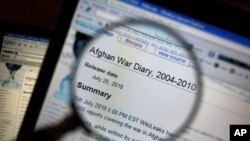The Pentagon appealed to news organizations Monday not to spread classified information released by the WikiLeaks Internet website. The site's owners are expected to release hundreds of thousands of secret Pentagon documents on the Iraq War, perhaps this week.
Pentagon spokesman, Marine Corps Colonel Dave Lapan said officials think they know which documents WikiLeaks has, and are ready to take steps to protect anyone put in danger by the expected release. Lapan said a special 120-member Pentagon task force is prepared with a series of moves to protect people quickly, unlike the period after a previous WikiLeaks release in July, when it took the the Defense Department weeks to review some 77,000 documents related to Afghanistan.
In a letter a month after that release, which has just been made public, U.S. Defense Secretary Robert Gates told a senior member of Congress that the documents deal mainly with tactical military options. Gates said the Pentagon's review of the documents had not, up to that time, "revealed any sensitive intelligence sources and methods compromised by this disclosure." But the secretary still argues that the release of the names of Afghan nationals who helped U.S. forces puts those people in danger, and he said the release still could cause "significant harm or damage" to U.S. national security interests.
Some news reports say WikiLeaks might release up to 400,000 documents this week related to the Iraq War. But the site's owner, Julian Assange, has tried to tamp down expectations.
As part of an effort to minimize the impact of any release, Pentagon spokesman Lapan called on news organizations not to help WikiLeaks spread the secret information.
"News organizations should be cautioned not to facilitate the leaking of classified documents with this disreputable organization known as WikiLeaks. The concern is WikiLeaks as an organization should not be made more credible by having credible news organizations facilitate what they're doing."
Lapan said he does not have a problem with news coverage so far. But he said when established news organizations report on the WikiLeaks material, they provide "a veneer of legitimacy" to what he called an "irresponsible" organization." He said efforts to remove the names of Iraqis from the new set of documents are not enough.
"Even removing names from these documents doesn't necessarily make them safe," said Lapan. "They are still classified documents. There is still information in there that people outside the U.S. government may not be qualified to decide what can be safely redacted or not."
The Pentagon spokesman again called on WikiLeaks to return all of the classified information it has obtained, a demand the group has ignored for months.




